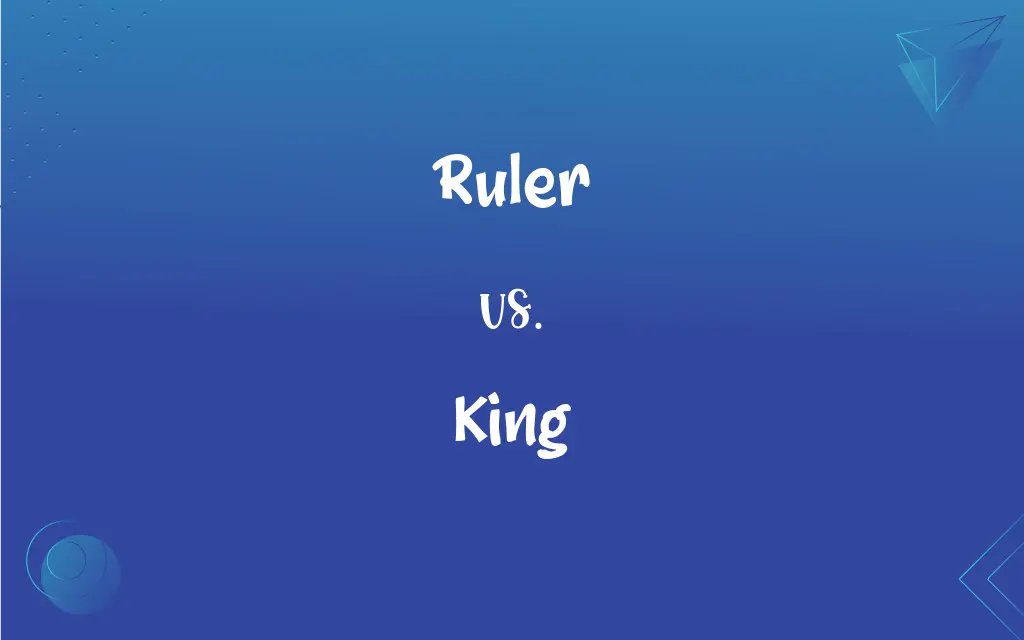Ruler vs. King: What's the Difference?
Edited by Janet White || By Harlon Moss || Updated on November 2, 2023
A ruler is a person who governs or controls a country, whereas a king is a male monarch of a kingdom, often inherited.

Key Differences
A ruler is a general term for a person who holds political power and authority over a region, country, or group. A king, specifically, is a male ruler of a sovereign state who typically inherits his position through a royal family line.
The title of king is often associated with historical and traditional sovereignty, whereas a ruler can be any head of state or leader, irrespective of the system of governance. Kings usually rule until death or abdication, and the title "king" connotes a certain historical and ceremonial significance.
While a king is always a ruler, not all rulers are kings; rulers can also be queens, presidents, emperors, or other titles. Kings usually have their status ratified by customs, laws, or religious practices, distinguishing their title from other rulers.
A ruler's scope can vary from a city-state to an entire empire, while a king traditionally rules a kingdom. Both wield considerable influence, but the nature and extent of their powers can be constitutionally, culturally, or historically defined.
Comparison Chart
Definition
A person who governs or leads.
A male monarch of a kingdom, typically hereditary.
ADVERTISEMENT
Scope of Authority
Can range from a tribe to an entire nation.
Usually presides over a defined and recognized kingdom.
Gender Specification
Gender-neutral term.
Specifically male.
Method of Succession
Can vary: election, appointment, heredity, or conquest.
Often hereditary through a royal lineage.
Historical Context
A broad term used across various cultures and eras.
Traditionally associated with monarchy and nobility.
Ruler and King Definitions
Ruler
A person who has control over a country or area.
The ruler issued a decree for economic reforms.
ADVERTISEMENT
King
A male monarch of a sovereign state.
The king led his nation through a period of unprecedented peace.
Ruler
An individual who makes decisions and laws for a group.
The ancient city's ruler was known for wise governance.
King
A reigning male sovereign.
The king decreed a festival to celebrate the harvest.
Ruler
The head of a government or kingdom.
The ruler held court with fairness and strength.
King
The hereditary male head of a royal family.
The king was crowned in a lavish ceremony.
Ruler
A person with supreme authority over a nation.
History remembers her as a just and noble ruler.
King
A man who rules a kingdom by birthright.
Legends speak of a king who united the lands.
Ruler
The sovereign head of a state or territory.
The ruler dedicated his reign to the people's prosperity.
King
A male ruler of a realm, typically for life.
The king's wisdom was known far and wide.
Ruler
One, such as a monarch or dictator, that rules or governs.
King
A male sovereign.
King
One that is supreme or preeminent in a particular group, category, or sphere
"In many countries, soccer is the king of sports" (Cameron W. Barr).
FAQs
Can a ruler be female?
Yes, the term is gender-neutral.
What are the types of rulers in history?
Kings, queens, emperors, pharaohs, and empresses, among others, are historical types of rulers.
Is "ruler" used in a democratic system?
It's less common, as terms like "president" or "prime minister" are more specific, but it can be used.
Is "ruler" synonymous with "dictator"?
Not always; "dictator" implies absolute power and often a lack of legitimate ascension, which is not necessarily the case with "ruler."
Is "king" a universal term?
While many cultures have similar positions, the specific title of "king" and its associated traditions can vary greatly.
Can the term "ruler" refer to a modern government official?
Yes, it can refer to any head of state or government official who has authority over a nation or region.
What is a ruler?
A ruler is a person who commands over others, especially a monarch or sovereign of a country, or it can be a tool used for measuring length.
What powers does a king typically have?
It depends on the country's system; in absolute monarchies, a king may have extensive powers, whereas in constitutional monarchies, his role may be mostly ceremonial.
Does a king always rule for life?
Traditionally, yes, but abdications and forced removals have occurred.
Are there still kings today?
Yes, there are many countries with kings, though their powers and roles vary.
What materials are rulers (tools) made from?
They are commonly made of plastic, wood, or metal.
Can "ruler" imply a moral or spiritual leader?
It's possible but less common; terms like "guide" or "mentor" are more typically used in that context.
How is a ruler's length typically measured?
Rulers are typically measured in centimeters and inches.
How does one become a king?
Traditionally, one becomes a king by heredity, but in some histories, kings have been elected or have seized power.
Can a king also be a ruler?
Yes, a king is a type of ruler.
What is the difference between a king and an emperor?
An emperor typically rules over an empire, which may consist of multiple kingdoms; a king rules over a single kingdom.
What symbolizes a king's authority?
A crown is the traditional symbol of a king's authority, along with a scepter and throne.
How are rulers used in geometry?
They are used to draw straight lines and measure distances on paper.
What is a king's wife called?
A king's wife is typically called a queen, but she may be a queen consort if she does not rule in her own right.
What is a king?
A king is a male monarch, often the head of state of a kingdom, who usually inherits his position by birth.
About Author
Written by
Harlon MossHarlon is a seasoned quality moderator and accomplished content writer for Difference Wiki. An alumnus of the prestigious University of California, he earned his degree in Computer Science. Leveraging his academic background, Harlon brings a meticulous and informed perspective to his work, ensuring content accuracy and excellence.
Edited by
Janet WhiteJanet White has been an esteemed writer and blogger for Difference Wiki. Holding a Master's degree in Science and Medical Journalism from the prestigious Boston University, she has consistently demonstrated her expertise and passion for her field. When she's not immersed in her work, Janet relishes her time exercising, delving into a good book, and cherishing moments with friends and family.






























































